|
T of C
Home |
My Work |
Hand- books |
Qin as Object |
Qin in Art |
Poetry / Song |
Hear, Watch |
Play Qin |
Analysis | History |
Ideo- logy |
Miscel- lanea |
More Info |
Personal | email me search me |
| Taiyin Daquanji ToC Folio 3 Folio 4: ToC 1 / 2 / 3 / 4 / 5 / 6 / 7-21 / Folio 5 ToC | 網站目錄 |
|
Taiyin Daquanji
1
Folio 4, Parts 7-21: Miscellaneous articles QQJC I/84-88) 2 |
太音大全集
卷四,己。。。。 |
Parts Seven to Twenty One: Miscellaneous articles
The original texts are all copied below; otherwise it is mostly summaries awaiting full translations
| Part 7 ; QQJC I/84b |
 7. 三聲論 San Sheng Lun: Discussion of Three Sounds (QQJC I/84)
7. 三聲論 San Sheng Lun: Discussion of Three Sounds (QQJC I/84)
Summary: It asks, "Scattered sounds" (open strings), "floating sounds" (harmonics) or "wooden sounds" (stopped strings): which are better? It answers, These are sounds of heaven, sounds of earth and sounds of humanity: they should be in proper balance. Unfortunately in modern times people often ignore this and play in a flashy manner: instead they should return to proper use of the 三才 Three Talents, where Heaven, Earth and Humanity work in proper harmony.
| 8. 琴本制起法象 The Origin and Symbolism of the Qin (QQJC I/84-5) | Parts 8-9 ; QQJC I/85a |
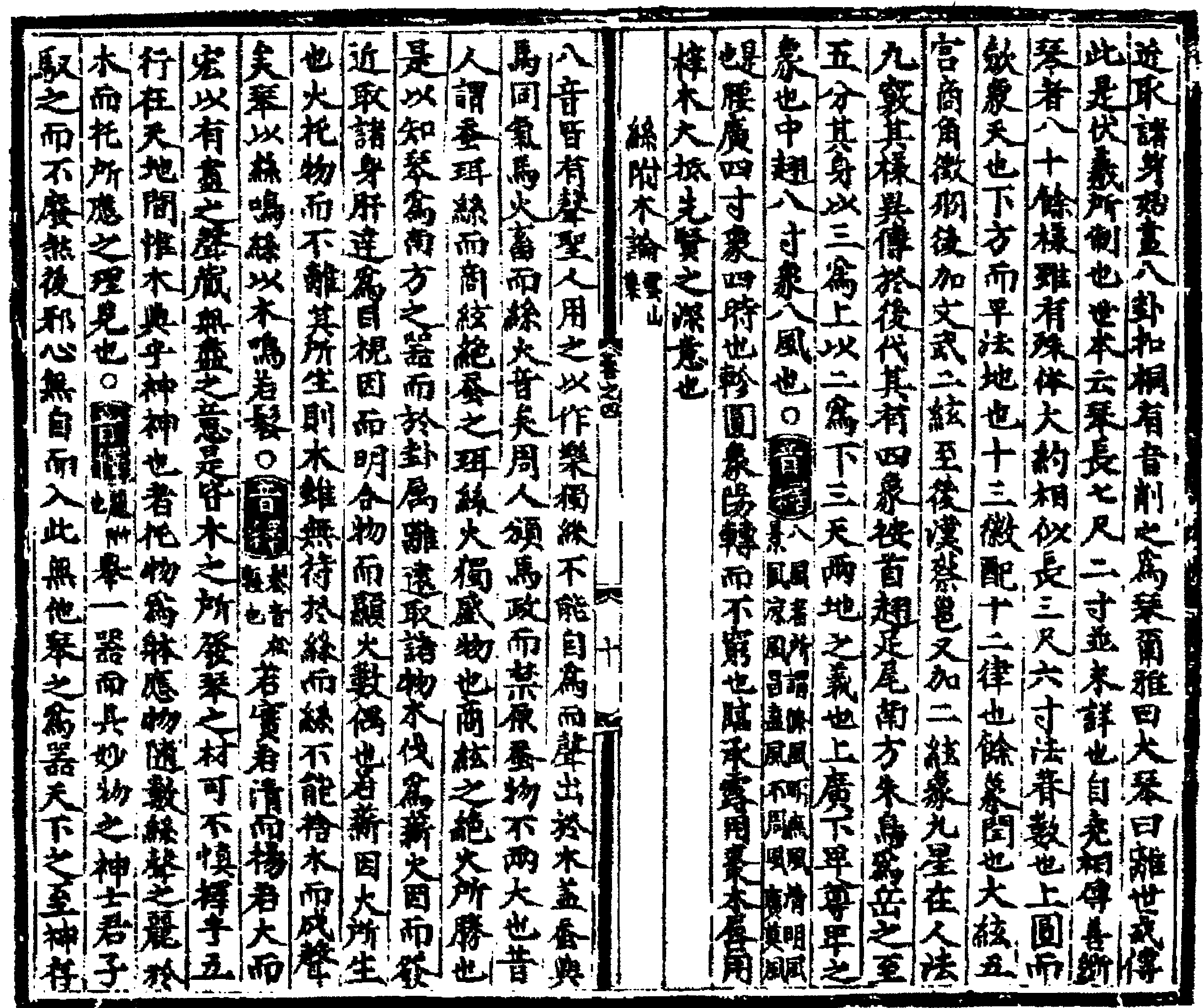 Summary: The legendary emperor Fuxi created the qin based on natural laws; then since Emperor Yao 80 varieties of qin have emerged. The dimensions follow the proper rules of cosmology and use natural materials.
Summary: The legendary emperor Fuxi created the qin based on natural laws; then since Emperor Yao 80 varieties of qin have emerged. The dimensions follow the proper rules of cosmology and use natural materials.
Summary: Silk alone cannot produce sound — it relies on wood to resonate. Wood supports and amplifies silk’s voice, just as fire depends on wood to burn. The profundity of the qin’s sound arises from this harmony, symbolizing the deep connection between material form and spiritual resonance.
| 10. 琴材論 Discussion of Qin Materials (QQJC I/85) | Parts 10-11 ; QQJC I/85b |
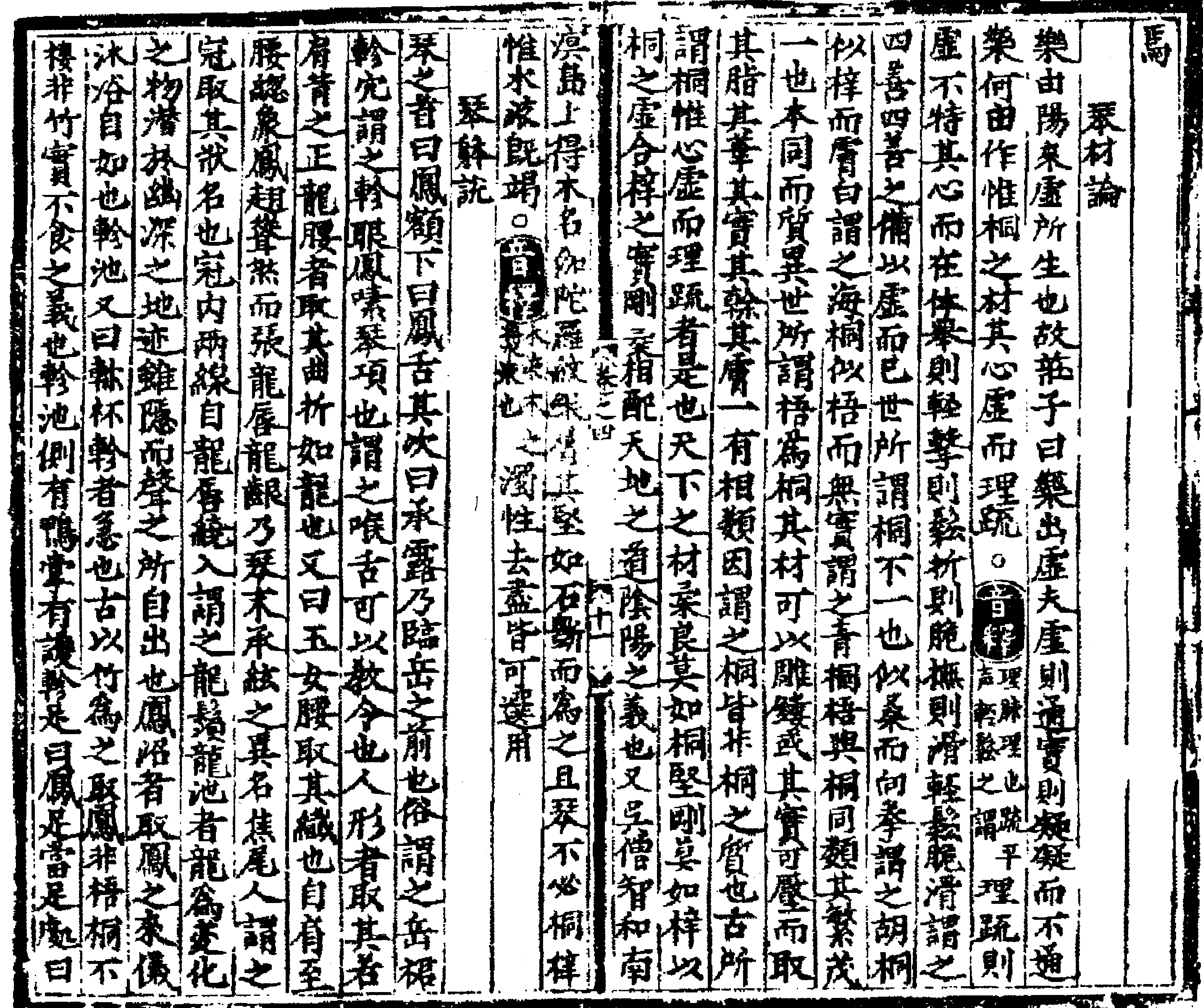 Summary: The best wood for making qin is "桐 tong" because it has a 虚 hollow core and a 理疏 loose grain. However, not all tong wood is the same: there are 胡桐 hutong, 海桐 haitong and 青桐 qingtong as well as 梧桐 wutong. It then seems to suggest none of these by itself is perfect and other woods can also work if the 木液 sap has been dried out and other impurities removed.
Summary: The best wood for making qin is "桐 tong" because it has a 虚 hollow core and a 理疏 loose grain. However, not all tong wood is the same: there are 胡桐 hutong, 海桐 haitong and 青桐 qingtong as well as 梧桐 wutong. It then seems to suggest none of these by itself is perfect and other woods can also work if the 木液 sap has been dried out and other impurities removed.
11. 琴體說 Speaking of the Qin Structure (QQJC I/85-6)
Summary: Goes through the significance of the names of different parts of the qin and mentions symbolisms in its shape ending with the Heaven and Earth Pillars that support the qin on the inside. For more on this see the image and commentary
here.
| 12. 論絃养七星 Discussing How the Strings Resemble the Seven Stars (QQJC I/86) | Parts 11-14 ; QQJC I/86a |
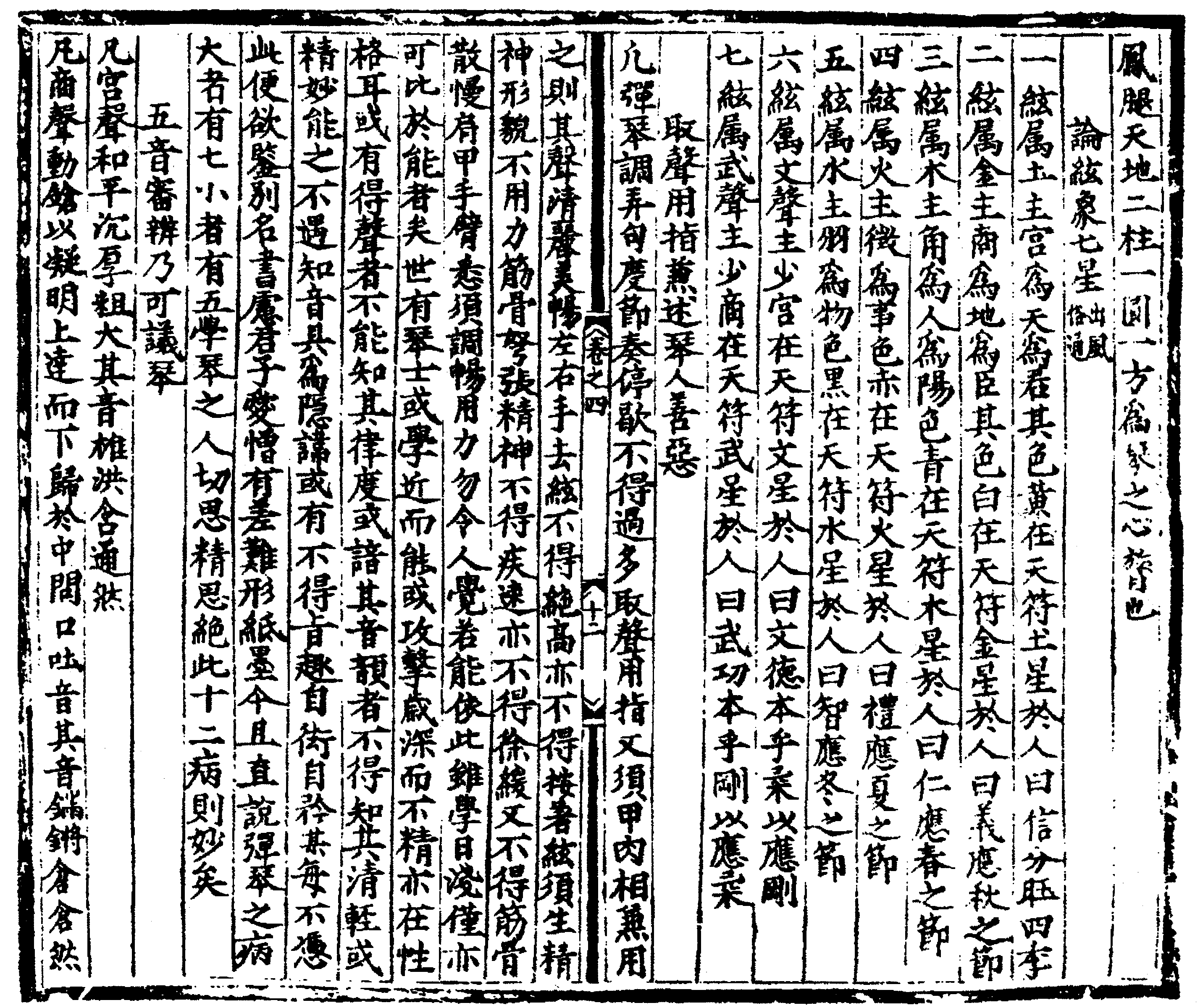 The same information is given here.
The same information is given here.
二絃屬金, 主商,為地為臣,其色白,在天符金星,於人曰義,應秋之節。
三絃屬木, 主角,為人為民,色青,在天符木星,於人曰仁,應春之節。
四絃屬火, 主徵,為事,色赤,在天符火星,於人曰禮,應夏之節。
五絃屬水, 主羽,為物,色黑,在天符水星,於人曰智,應冬之節。
六絃屬文聲,主少宫,在天符文星,於人曰文德,本乎柔以應剛。
七絃屬武聲,主少商,在天符武星,於人曰武功,本乎剛以應柔。
| 14. 五音審辦乃可議琴 The Five Tones Examined and Arranged so as to Explain Qin (QQJC I/86) | Parts 14-15 ; QQJC I/86b |
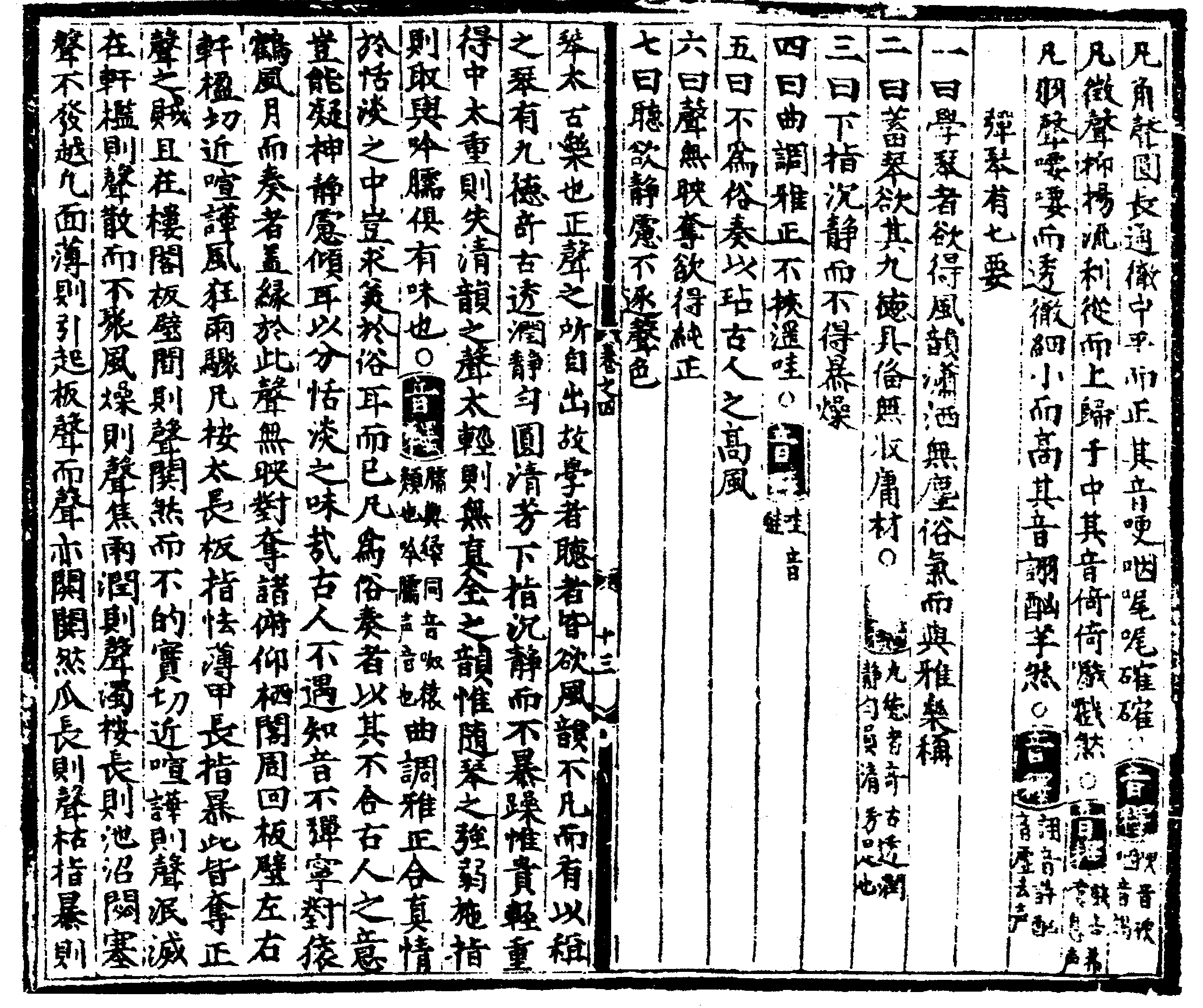
凡商聲。動鎗以凝明,上達而下歸於中,開口吐音。其音鏘鏘倉倉然。
凡角聲。圓長通徹,中平而正。其音哽咽,娓娓確確然。(音釋:哽,音梗。咽,音謁。)
凡徵聲。抑揚流利,從(下)而上歸於中。其音倚倚然。(音釋:嚱,音希,歎息聲。)
凡羽聲。而透徹,細小而高。其音詡酗芋然。(音釋:詡,音許。酗,音虚。)
Translation:
Gong sound: Harmonious, deep, thick, and coarse; its tone majestic and grand, carrying a resonant openness.
Shang sound: Piercing yet clear, soaring then settling into balance, clearly articulated; its tone can sound like "qiang-qiang cang-cang".
Jue sound: Flowing and resonant, balanced and upright; its tone quavering, yet flowing and distinct."
Zhi sound: Undulating smoothly, rising from below then settling into balance; its tone lilting and expressive, resembling sighing sounds.
Yu sound: Penetrating and clear, fine and high-pitched; its tone ethereal and floating.
15. 彈琴有七要 Seven Essentials for Qin Play (QQJC I/86)
琴,太古樂也,正聲之所自出。故學者聽者皆欲風韻不凡,而有以稱之。
琴有九德:奇、古、透、潤、静、匀、圓、清、芳。
下指沉静而不暴躁,惟貴輕重得中,太重則失清韻之聲,太輕則無真全之韻。惟隨琴之强弱施指則取與吟臑,俱有味也。
曲調雅正,合真情於恬淡之中,豈求美於俗耳而已。
凡為俗奏者,以其不合古人之意,豈能凝神靜慮,傾耳以分恬淡之味哉?
古人不遇知音不彈,寧對猿鶴風月而奏者,盖緣於此。
聲無映對,奪諸俯仰,棲閣周回,板壁左右,軒楹切近,喧嘩風狂雨驟。
彈琴有七要
Those who study the qin should aspire to the graceful bearing of wind and the fullness of wine — free from vulgar airs, and in harmony with the elegance of refined music.
When acquiring qin one should select only those instruments that embody all
九德 nine virtues, and not gather mediocre specimens.
(Gloss) The “nine virtues” are: qi uniqueness, gu antiquity, tou penetration, run resonance, jing quietude, yun balance, yuan roundness, qing clarity and fang fragrance (metaphorical elegance.)
When lowering the fingers (to play), one must be calm and composed, and must not be rash or impetuous.
The melodies played should be noble and upright in tone, and must not contain licentious or insinuating elements.
One must not perform vulgar pieces, lest one dishonor the lofty style of the ancients.
The tone should be free from distortion and interference; one must strive for purity and correctness.
In listening, the mind must be still and reflective, not driven by mere sounds or sensory distractions.
Qin represents the music of antiquity, the source of the purest sound. Therefore, its learners and listeners both should aspire to extraordinary refinement in order truly to appreciate it. The qin has Nine Virtues: uniqueness, antiquity, resonance, smoothness, tranquility, balance, roundness, clarity, and fragrance. When the fingers are applied to the strings, they must do so with calm precision, neither too forcefully nor too lightly. Too much pressure causes a loss of clarity; too little yields a sound lacking full resonance. One must follow the instrument’s natural strength and delicacy, adjusting touch accordingly—then both fingered tones and vibrato techniques (yin nao) will attain their expressive flavor.
Gloss: The first character is pronounced "nao"; it resembles a gibbon howling.
The second, yin, has a hearty (?) sound.
Melodies must be elegant and upright, expressing genuine feeling within a restrained and tranquil idiom. It is not merely about appealing to vulgar ears.
Anyone who plays vulgar or flashy music acts against the spirit of the ancients. How, then, could they concentrate their spirit and still their thoughts to taste the delicate subtleties of such ancient music?
The ancients would rather play to monkeys and cranes, to the wind and moon, than perform for those who could not understand them. This is why they would not play unless they meet a kindred spirit.
The qin tone must not be affected by echoes, distortions, or reflections from the surroundings — whether bouncing from above or below, or reflecting from screens, walls, balconies, or other architectural elements.
惟堂室静密,天朗氣清,周回實壁,俯臨實幾,擊打以指面而附聲於甲,則聲斯全真矣。
聽欲静慮者,欲分古淡之味也,貴乎耳目專一,而不為一物所奪也。
Long desks, thin boards, overextended fingernails, or rough finger movements can all distort or steal away the true tone.
In elevated buildings or against thin walls, the tone becomes booming and unreal.
In noisy or confined environments, or in proximity to loud sounds, the tone becomes muddled or disappears altogether.
In balconies or open-air settings, the tone becomes scattered and unfocused.
In dry winds, the tone becomes brittle;
In damp weather, the tone becomes muddied.
Pressing too long suppresses resonance.
Thin table surfaces cause the resonance to activate board sounds, making the tone echo and boom unnaturally.
Overgrown fingernails produce dull and withered tone;
Forceful or rough fingers cause the strings to be pinched, and the tone loses its integrity and fullness.
The ideal setting is a quiet, enclosed room with clear weather and fresh air, solid surrounding walls, and a sturdy desk surface close to the body. When one strikes with the flesh of the finger, assisted by the nail, the resulting tone will be full, true, and resonant.
To listen properly, one must still the mind and reflect deeply in order to taste the subtle and ancient flavor of the music. This requires the concentration of both ear and eye, undistracted by any external thing.
| 16. 琴有九德 A Qin should have Nine Virtues ("Innate Powers") (QQJC I/87) | Parts 16-18 ; QQJC I/87a |
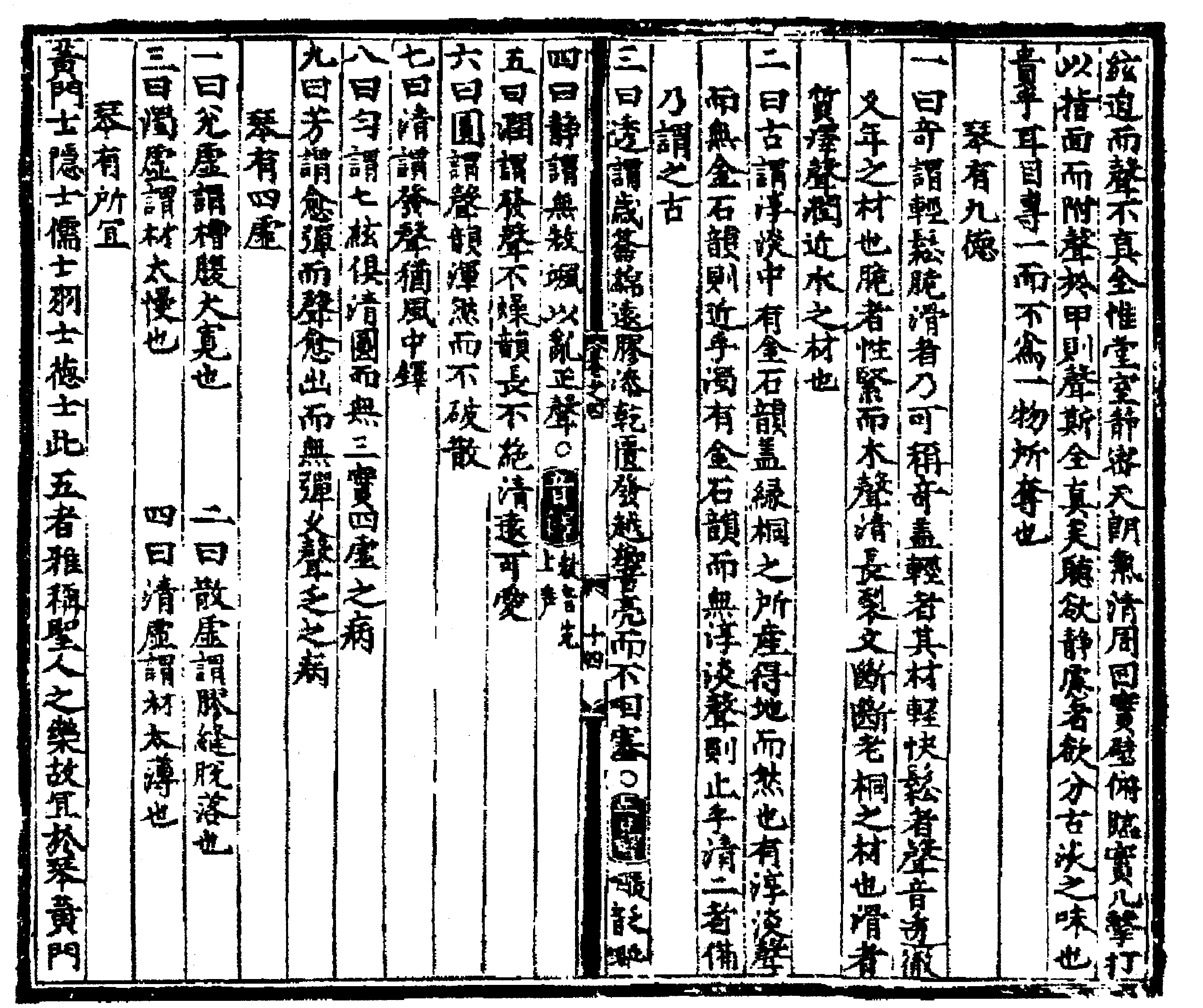 These are as listed in the previous entry, but in slightly different order and with the following commentary added.
These are as listed in the previous entry, but in slightly different order and with the following commentary added.
- 一曰「奇」,謂輕、鬆、脆、滑者,乃可稱奇。蓋輕者,其材輕快;
鬆者,聲音透徹,久年之材也;脆者,性緊而木聲清長,裂紋斷斷,老桐之材也;滑者,質澤聲潤,近水之材也。
Qí – Exceptionality: (The qin) should possess the qualities of lightness, resonance, clarity, and smoothness before it can be called exceptional. Specifically:- Lightness (輕 qīng): The material of the qin is light and has a quick response.
- Resonance (鬆 sōng): When plucked, the sound is penetrating, indicative of aged wood.
- Clarity (脆 cuì): The texture is tight, producing clear and prolonged tones, often found in old paulownia wood.
- Smoothness (滑 huá): The texture is lustrous, and the sound is mellow, characteristic of wood grown near water.
- 二曰「古」,謂淳淡中有金石韻,蓋緣桐之所産,得地 而然也。有淳淡聲而無金石韻,則近乎濁;有金石韻而 無淳淡聲,則止乎清;二者備,乃謂之「古」。
Gǔ – Antiqueness: The sound should be pure and simple, yet resonate with durable and firm timbres. This quality arises from the specific region where the paulownia wood is sourced. A sound that is pure but lacks this firm resonance may seem dull; conversely, a hard sound without purity may be overly sharp. A balance of both is considered "antique."- 三曰「透」,謂歲月綿遠,膠膝乾匱,發越響亮而不哽塞。
Tòu – Transparency: Over time, as the adhesive has dried and shrunk, the qin produces a bright and resonant sound without obstruction.匱,乏也。咽,音謁。
Kui means "floating" (the lacquer has loosened and "floats" on the surface of the qin, thus interfering less with the sound?)- 四曰「靜」,謂之無殺颯以亂正聲。 (「㪇」音「先」,上聲。)
Jìng – Serenity: The sound should be free from harshness or abruptness that could deaden or enfeeble the correct tones.- 五曰「潤」,謂發聲不躁,韻長不絕,清遠可愛。
Jùn – Mellowness: The tones produced are gentle, with prolonged resonance that is clear, distant, and pleasing.- 六曰「圓」,謂聲韻渾然而不破散。
Yuán – Roundness: The sound and resonance are harmonious and complete, mpy broken or scattered.- 七曰「清」,謂發聲猶風中(之)鐸。
Qīng – Clarity: The emitted sound resembles a bell ringing in the wind, clear and melodious.- 八曰「勻」,謂七絃俱清圓,而無三實四虛之病。
Yún – Evenness: All seven strings produce sounds that are uniformly clear and rounded, avoiding issues where "three strings sound solid while four are hollow"".- 九曰「芳」,謂愈談而聲愈出,而無彈久聲乏之病。
Fāng – Fragrance: The more the qin is played, the more its sound emerges, without the problem of tones becoming dull over extended play.
A somewhat revised description of these nine, as included in Gao Lian's Eight Discourses on Living, is translated by Pei-You Chang on her website.
| 18. 琴有所宜 Qin has those who are dignified (QQJC I/87) | Parts 18-19 ; QQJC I/87b |
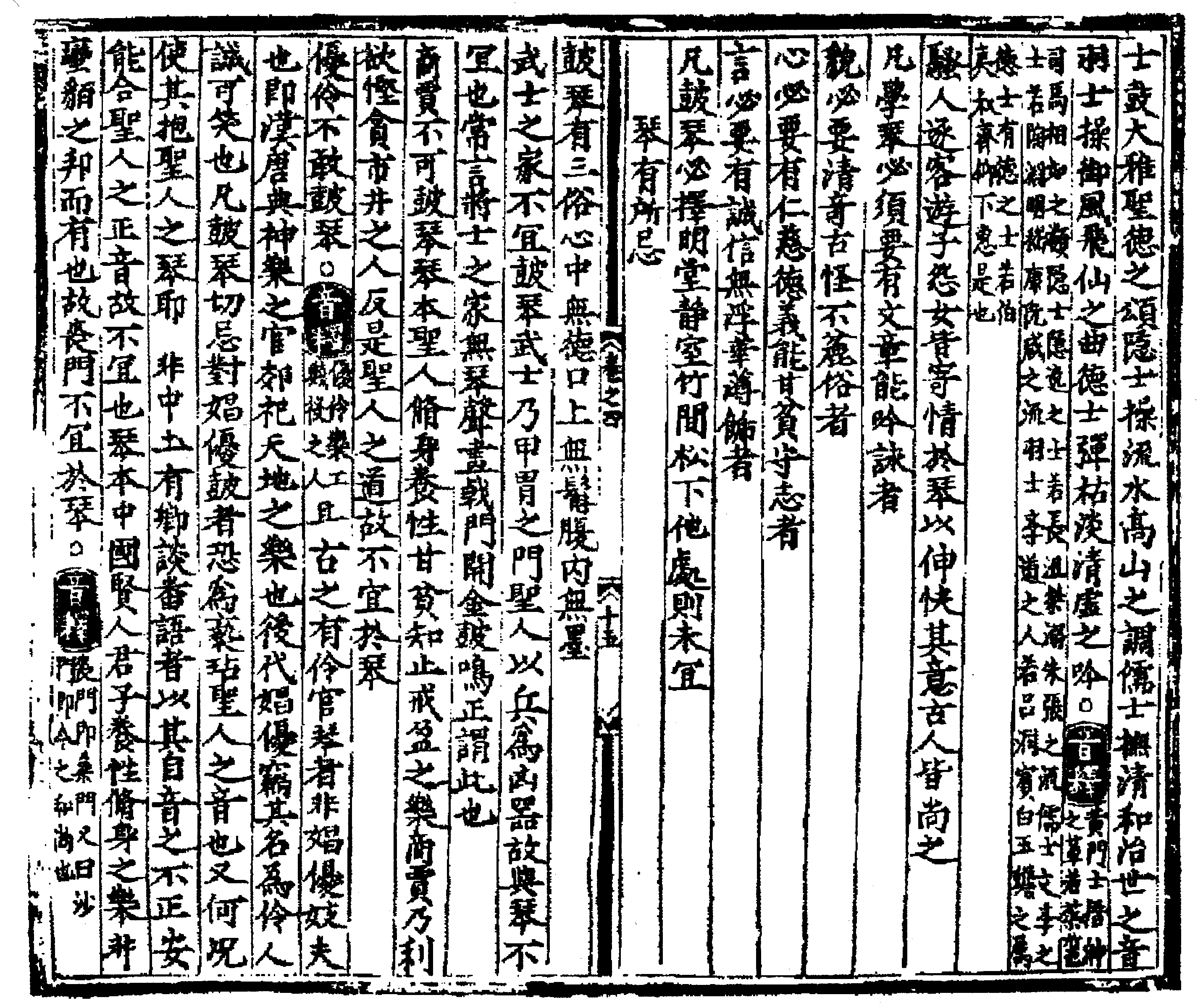 Begins with a list of five types of gentlemen, followed by a brief characterization of each. This is followed by a long yinshi, plus five more lines each with a rule, then a closing statement
Begins with a list of five types of gentlemen, followed by a brief characterization of each. This is followed by a long yinshi, plus five more lines each with a rule, then a closing statement
此五者,雅稱聖人之樂,故宜於琴。黄門士,鼓大雅聖徳之頌。 隱士操流水高山之調。儒士撫清和治世之音。羽士操御風 飛仙之曲。徳士彈枯淡清虚之吟。
音釋: 黄門士,縉紳之輩,若蔡邕、司馬相如之類;隱士,隱逸之士,若長沮、桀溺、朱張之流;儒士,文學之士,若陶淵明、嵇康、阮戚之;羽士,學道之人,若吕洞賓、白玉蟾之屬;德士,有德之士,若伯夷、叔齊、柳下惠是也。
凡鼓琴必擇明堂室。竹間松下。他處則未宜。
| 20. 琴經須知 Qin Standards that must be known (QQJC I/88) | Parts 19-21 ; QQJC I/88a |
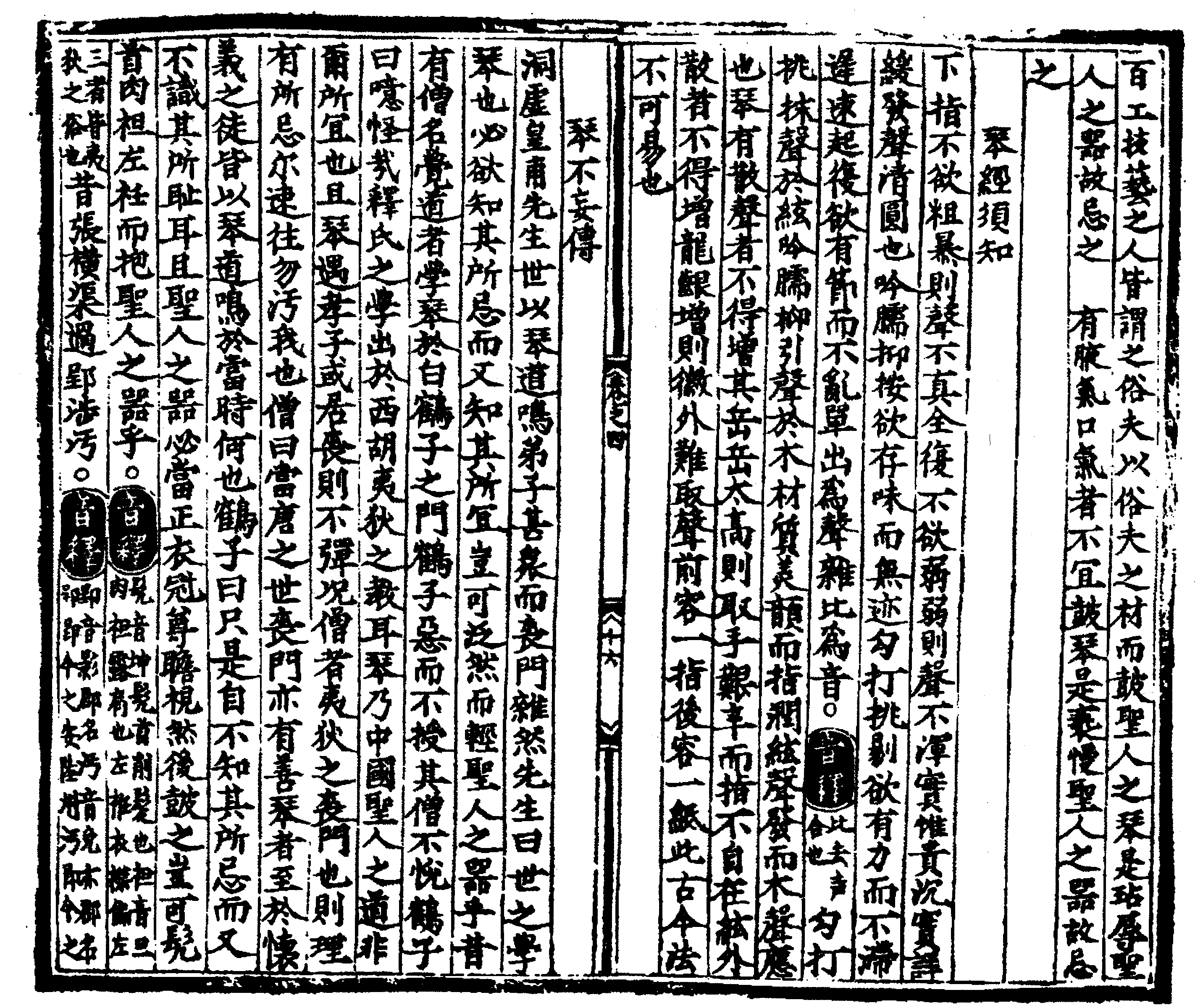 (Technical details of playing.)
(Technical details of playing.)
21. 琴不妄傳 Qin should not be improperly transmitted (QQJC I/88)
昔有僧名覺道者,學琴於白鶴子之門,鶴子惡而不授,其僧不悦。
鶴子曰:『噫!怪哉!』釋氏之學,出於西胡夷狄之教耳。
琴乃中國聖人之道,非爾所宜也,且琴遇孝子或
居喪則不彈,况僧者,夷狄之喪門也。則理有所忌,
爾速往,勿污我也。』僧曰:『當唐之世,喪門亦有善琴
者,至於懷義之徒,皆以琴道鳴於當時,何也?』鶴子
曰:『只是自不知所忌。』又曰:『不識其所恥。且聖人之
器,必當正衣冠,尊瞻視,然後鼓之。豈可髡首肉袒。左袵,
而抱聖人之器乎?』
音釋:髡,音坤,髡首,削髮也。袒,音旦,肉袒,露肩也。左袵,衣襟偏左。三者皆夷狄之俗也。
昔張横渠過郢涉沔,
故程子所謂:『無父無君,惡乎?善乎?』
朱文公曰:『只是廢三綱五常一事,已是極大罪名了,其他更不消說。』
石守信《怪論》曰:『彼其滅君臣之道,絕父子之親,棄
道德悖禮樂,裂五常移四民,毀中國之衣冠,絕祖
宗之祭祀,髡髮左衽,誠天地間一大罪人耳。豈可
使抱聖人之器哉?反不以為怪乎?
Finally this part discussed the four types of people who shouldn't play qin: monks, actors and entertainers, vulgar people and people without moral virtues.
嗚呼!琴之為道,大矣!為物,貴矣!凡為人師者,必擇慈祥温裕,
天姿挺秀,文雅卓然者,方可以雅稱聖人之器而授之,不然,雖購千金之資,不可一顧也。
There have been numerous monastic qin players throughout history, including during the Song dynasty. They tended to ignore these attacks and just to their way. Notably, even Zhu Xi, who was very much anti-Buddhist, eventually admitted that some monks played with 清高之氣 a noble spirit.
太古遺音卷四終 End of Taiyin Daquanji, Folio 4
Much of the information here is also elsewhere in early qin handbooks. My own translation and specific comments on this passage are not yet ready for presentation.
1.
太音大全集 Taiyin Daquanji Folio 4, Parts 7-21 (QQJC 30 Volume edition I/84-88; QF/77-85)
A large part of this page was adapted from
this webpage on
douban.com.
2.
Explanations by translator
The qin should only be taught to the "right sort of people". (Anti-Buddhist tirade.)
Master Dongxu Huangfu was renowned for his master of the Way of the Qin. He had many disciples — yet Buddhist monks would intrude among them. The Master said: "Those who study qin must understand its taboos and proprieties. How can one treat the Sage’s instrument with such irreverence?"
On (another) occastion, a monk named Juedao sought qin instruction from Master Baihezi. Baihezi rejected him harshly. Baihezi declared: "...The qin embodies the Way of Chinese Sages—unsuited to you! We silence qins for filial mourners; how much more for monks? Leave, lest you defile me!" The monk protested: "In the Tang era, Buddhist monks mastered qin — like Huaiyi. Why deny me?" Baihezi retorted: "They knew not their taboo!... How dare you with your shaved head, bare shoulders and left-lapped robe, embrace the Sage’s instrument?"
Gloss: Kūn means shaving one's head; ròutǎn means exposing one's shoulders; zuoku Means tilting a garment label to the left. All three are customs of "barbarians".
Once, as Zhang Hengqu (Zhang Zai, 1020–1077, a Neo-Confucian philosopher] passed through* Ying (modern Anlu, Hubei) and strode to Mian (Mianyang, Hubei),
Gloss: identifies Ying and Mian.
End of Part 21; QQJC I/88b
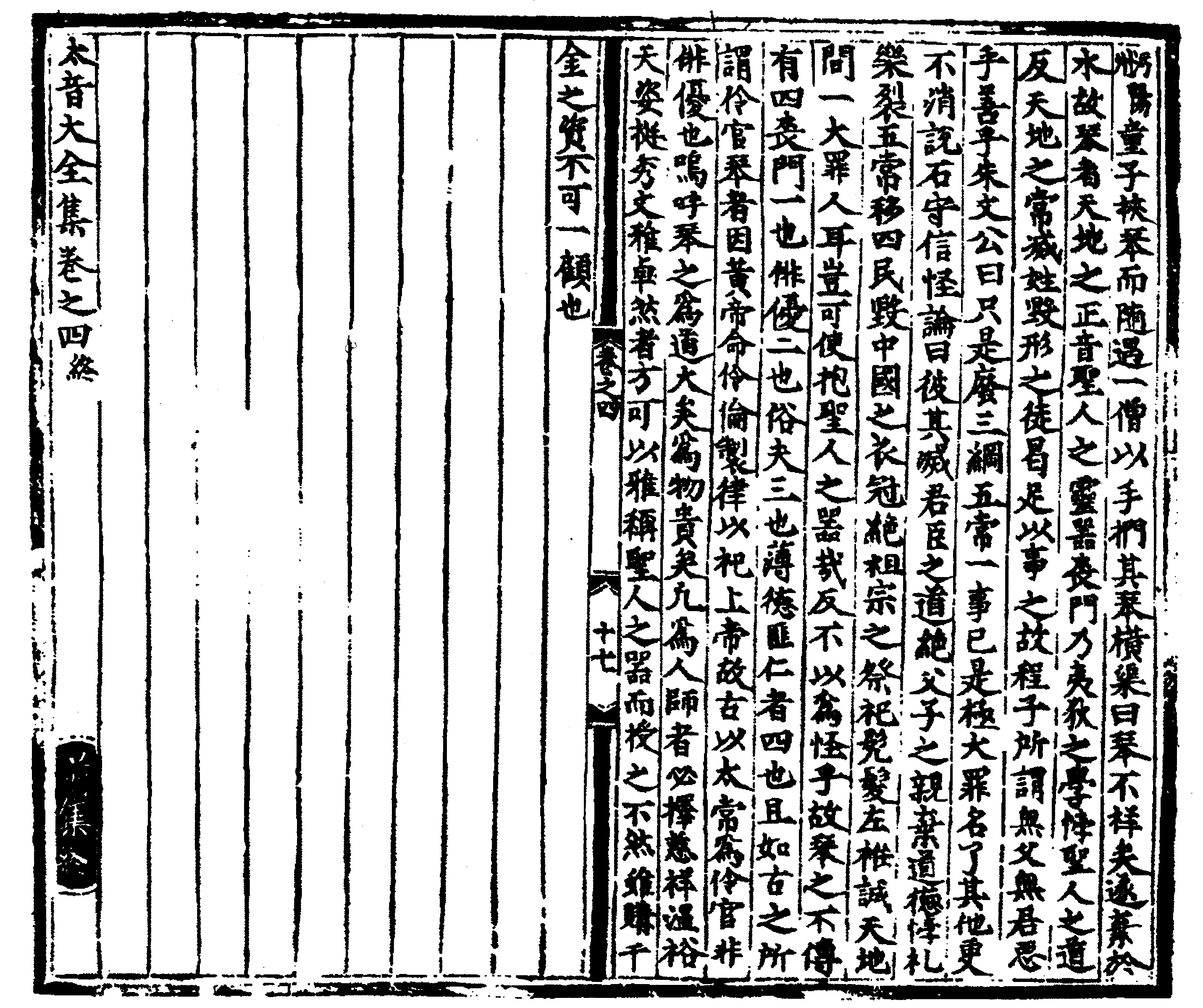 童子挾琴而隨,遇一僧以手捫其琴,横渠曰:『琴不
祥矣。』遂棄於水。故琴者,天地之正音,聖人之靈器,
喪門乃夷狄之學,悖聖人之道,反天地之常,滅性
毀形之徒,曷足以事之?
童子挾琴而隨,遇一僧以手捫其琴,横渠曰:『琴不
祥矣。』遂棄於水。故琴者,天地之正音,聖人之靈器,
喪門乃夷狄之學,悖聖人之道,反天地之常,滅性
毀形之徒,曷足以事之?
a youth followed him carrying a qin. A monk touched the qin with his hand. Zhang declared: "This qin is now defiled!" and cast it into the river.
Thus does the qin embody Heaven-and-Earth’s pure sound and is the Sages’ sacred instrument. Buddhists practice barbarian doctrines, rebel against the Sages’ Way, invert cosmic order, and are body-destroying ascetics. How could they serve (the qin)?
Hence Chengzi (Cheng Yi, 1033–1107) stated: "Those without father or sovereign — is this not evil? Is it acceptable?"
Zhu Wengong (Zhu Xi, 1130–1200) declared: "To abolish the Three Bonds and Five Constants alone is an unforgivable crime. The rest need not be said."
Shi Shouxin’s "Extraordinary Thesis" argued: "They destroy ruler-subject duty, sever father-son bonds, discard morality, violate ritual-music, shatter the Five Constants, disrupt the Four Occupations, ruin Chinese robes/caps, cease ancestral sacrifices, and adopt shaved heads/left-lapped robes. Truly, they are Heaven-and-Earth’s great criminals! How could they hold the Sages’ instrument?"
And so, there are four types of people forbidden from qin transmission**:
First: Buddhists, second: entertainers (performers who vulgarize sacred art), third: vulgar people, and fourth: the virtueless and inhumane. Those like (the ancient qin ritual master Ling Lun, whom the Yellow Emperor tasked with creating pitch standards for worshipping Heaven, and held the office of Grand Sacrificer (太常). They were ritualists, not entertainers.
Alas! The Way of the qin is profound! As an object, it is sacred!
(Thus) a qin master must select disciples who are benevolent, dignified, and harmonious, naturally gifted and outstanding, and cultured and classically refined.
Only such are worthy to receive the Sage's instrument. Otherwise – even if offered a thousand pieces of gold – do not give them a glance.
Go to the beginning of Folio 5 or to the
Folio 5 ToC
Or return to the Folio 4 Table of Contents
Footnotes (Shorthand references are explained on a
separate page)
See the Comment on the different editions.
(Return)
See comments concerning the structure of the original text.
(Return)
Return to Taiyin Daquanji